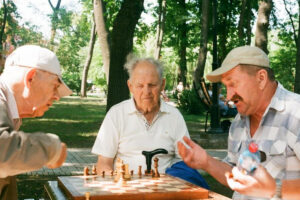Social Engagement: Key to Mental Wellness in Seniors
Imagine a world where you feel connected, supported, and valued. A place where your mental wellness thrives, and loneliness is a distant memory.
In this world, social engagement is the key that unlocks the door to belonging and fulfillment. As a senior, you can create this world for yourself. By actively participating in social activities and building strong networks, you can experience the profound benefits of emotional support.
Get ready to embark on a journey of social connection, for it holds the secret to your mental wellness.
Importance of Social Connection
Why is social connection important for your mental wellness?
As human beings, we thrive on connection and belonging. When socially isolating, isolation acts on our mental and emotional well-being.
Research has shown that individuals who lack social connections are at a higher risk of developing mental health issues such as depression and anxiety. On the other hand, community involvement can provide a sense of purpose and belonging, which are essential for maintaining good mental health.
Engaging with others allows us to share our experiences, emotions, and challenges and receive support and understanding in return. It helps alleviate loneliness and isolation, fostering a sense of connectedness vital to well-being.
Impact of Loneliness on Mental Health
Loneliness can significantly affect your mental health as a senior, leading to various adverse outcomes. The loneliness epidemic among seniors is a serious issue that needs to be addressed.
Here are some mental health consequences of loneliness that you should be aware of:
- Depression: Loneliness can contribute to feelings of sadness, hopelessness, and a lack of motivation. It can worsen symptoms of depression and make it harder to find joy in everyday life.
- Anxiety: The constant feeling of being alone can lead to increased stress and worry. It can make you feel on edge and constantly on guard.
- Cognitive decline: Studies have shown that loneliness is associated with cognitive decline and an increased risk of developing conditions like Alzheimer’s disease.
- Poor sleep: Loneliness can disrupt sleep patterns and lead to insomnia or poor-quality sleep. This can further exacerbate mental health issues.
- Increased mortality risk: Loneliness has been linked to a higher risk of mortality, highlighting the importance of social connections for overall well-being.
Understanding the impact of loneliness on mental health is crucial. It’s essential to seek support combat loneliness and protect your mental well-being, it’s engaged in social activities and foster meaningful connections to fight loneliness and pe, and resources are available to help you navigate these challenges.
Bof Emotional Support
Receiving emotional support from others can profoundly benefit your mental well-being as a senior. Emotional well-being is crucial for leading a fulfilling and happy life, and having a solid support system can greatly contribute to this. Significantly, having people who genuinely care about your feelings, listen to your concerns, and offer guidance and empathy can help alleviate stress, anxiety, and depression. Social interaction is significant in maintaining emotional well-being, enabling you to feel connected, valued, and understood.
Engaging in meaningful conversations, sharing experiences, and receiving emotional support can boost your self-esteem, provide a sense of belonging, and improve overall mental health. So, don’t hesitate to reach out to your loved ones, friends, or support groups for emotional support; they help you navigate life’s ups and downs.
Role of Social Activities and Hobbies
Social activities and hobbies can enhance your mental wellness as a senior. Staying socially connected and actively involved is essential to experiencing a sense of belonging and purpose. Here are some ways in which social engagement and hobbies can have a positive impact on your well-being:
- Joining a book club or discussion group can stimulate your mind and allow you to connect with like-minded individuals, fostering a sense of community.
- Taking up a hobby like painting, gardening, or playing an instrument can provide a creative outlet, boosting your self-esteem and sense of, and give you.
- Volunteering for a cause that resonates with you can offer a sense of fulfillment and purpose while also allowing you to make a difference in the lives of others.
- Participating in group fitness classes or sports activities can improve your physical health, boost your mood, and provide opportunities for social interaction.
- Attending social events or gatherings, such as parties or reunions, can help you reconnect with old friends and make new connections, reducing feelings of loneliness.
Building Strong Social Networks
Actively participating in social activities and hobbies can help build strong social networks, connect with others, and foster a sense of belonging and purpose.
Engaging in community outreach programs, such as volunteering at local organizations or attending neighbourhood events, provides neighbourhoods with the opportunity to meet new people and build relationships based on shared interests and values.
These connections can evolve into supportive friendships, in which people can rely on one another for emotional support, companionship, and practical help.
By actively engaging with an otherwise network of individuals who understand and appreciate you, making you feel valued and included.
Building strong social networks is essential for mental wellness as they provide a sense of longing and reduce feelings of loneliness and isolation.











